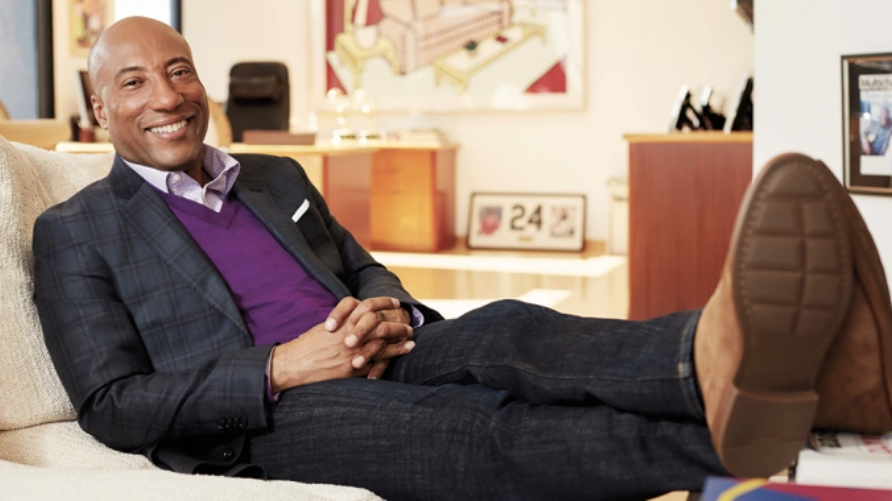
21 Oct Byron Allen’s Fight Against Racial Discrimination Has Roots in Inspiration From Dr. Martin Luther King Jr
By Steven Gaydos
There are still millions of Americans among us who remember where they were when Dr. Martin Luther King Jr. was assassinated in 1968 and countless millions more who have been inspired by the legacy of King’s historic work on behalf of civil rights. But there are few who’ve put their careers and companies on the line to advance King’s work more emphatically and dramatically than Byron Allen.
In 2015, after settling a long-running lawsuit against AT&T for discrimination, Allen’s Entertainment Studios filed a $10 billion lawsuit against Charter Communications, claiming the telecommunications giant was in violation of the 1966 Civil Rights Act. After five years of legal wrangling and bruising media coverage, the two sides settled out of court.
In that same year, Entertainment Studios also sued Comcast for $20 billion and years later that suit was also settled out of court. In May, Entertainment Studios sued fast-food titan McDonald’s for $10 billion, alleging racial discrimination in contracting in violation of federal and state law. So, how did a guy who broke into showbiz doing stand-up comedy while still in his teens, turn into the man that corporate giants, we can assume, don’t find very funny? And one who is getting a star on Hollywood’s Walk of Fame on Oct. 20.
For Allen, it all goes back to his childhood in Detroit, before he and his mother, Carolyn Folks, made the fateful trip West to Los Angeles when Byron was 8 years old. “When Martin Luther King was assassinated I saw the military take over my neighborhood,” Allen recalls. “I was looking down the barrel of a tank in my neighborhood as a 7-year-old kid. That was the moment I lost my innocence; I lost my childhood. I became a child of war. I realized that America looked at me differently. America didn’t love us. America tolerated us.”
Years later, Allen became acquainted with King’s legendary widow, Coretta Scott King, and that led to another personally galvanizing moment for the media mogul in the making.
“Coretta Scott King said to me, ‘As Black people in America, we’ve had four major challenges. No. 1: end slavery. No. 2: end Jim Crow. No. 3: achieve civil rights.’ And then she choked up, and she said, ‘And No. 4, the real reason they killed my Martin, achieve economic inclusion,’” Allen says. “And she said, ‘Byron, they didn’t kill my Martin over the speech, “I Have a Dream.” They killed him over the speech he gave at Stanford University, “The Other America.”’ And that’s the speech that most people don’t know about. And in that speech, he said there are two Americas. One America has access to opportunity, education, economic inclusion. The other America doesn’t. There are two Americas, and two Americas will not survive. We must become one America. She said, ‘That’s why they killed him.’”
Allen says that changed his perspective “forever.” He replied to her: “You and Martin have done more than enough. This generation will deal with the fourth and final chapter. We will achieve economic inclusion.”
“And she said to me, ‘They will come after you.’ And I said, ‘They’ve been coming after me since I was born to a Black teenage girl in April of ’61. So, it is what it is.’”
Cut to the 21st century, and Allen’s commitment to the Kings manifested itself in his legal crusades to force the hand of corporate America toward an economic equality that Allen passionately believes is still out of reach for Black America.
“I realized that the greatest trade deficit in America is the trade deficit between white corporate America and Black America,” Allen says. “And this is by design.”
After starting his career as a comedian and talk show host, Allen launched his Entertainment Studios banner in 1993. He was originally focused on nonfiction programming in the talk and court show space, but he expanded into scripted programming for screens big and small, as well as the stage, about a decade into the 21st century. Since then, the company has expanded even further, acquiring everything from TheGrio to the Weather Channel and individual television stations including in Hawaii, Indiana and Louisiana. He also has his hand in producing films.
At this fraught moment in America, post-George Floyd, while Black Lives Matter continues to make headlines and reparations remain a regular talk show topic, Allen reflects on a history he has marshalled his spirit and financial resources to rectify.
“I realized that slavery wasn’t about Black or white,” Allen continues. “Slavery was about economics, and we were brought here as Africans to enrich this nation economically. And then once we were freed, that’s when they started to commit full-on genocide against Black America.”
Allen explains how he views the unacceptable status quo that his lawsuits have railed against. “First, they make sure Black America doesn’t have access to a proper education. America kills us in the schoolroom by making sure we don’t have a proper education. America kills us in the courtroom by making sure we don’t have equal justice. And America kills us in the boardroom by making sure we don’t have economic inclusion, long before America puts their knee on our neck. That’s where the genocide is occurring. It’s occurring in the schoolroom, the boardroom and the courtroom.”
Allen’s rage against the machinations of systemic racism is balanced by a deep philosophical view of what one might call the Big Picture. His evangelism for change is not simply for the purpose of righting a wrong that began hundreds of years ago, it’s also hoping to ensure that the American experiment doesn’t run off the rails due to indelible hate and prejudices we’re obviously still yet to overcome.
“America is fragile because you can’t have a scenario where we have these two Americas,” asserts Allen. “We don’t have enough intellectual capital in America to survive and grow and to be competitive against several strong emerging foreign countries. In America, if you don’t have a proper education and if you’re not really engaged, then you’re a liability, and we can no longer afford liabilities. Every American needs to be positioned to achieve their best self. Because we need every American to be an asset and not a liability.”
With that simple statement of faith in a better America, Allen lays out the deeply idealistic roots of his legal pugilism.
“I decided to deal with the economic exclusion and the genocide against Black America. And I decided that not only was I going to build the world’s biggest media company, but I would build the world’s biggest media company with the purpose of creating one America. One America, because we — by example — will set the stage for the rest of the world and achieve one planet. And in doing so, we can achieve a slice of heaven right here on Earth.
“Unfortunately, we have media companies out here that divide us, but we are going to be the complete antithesis of that and be the media company that unites us — not only here in America, but around the world to achieve that slice of heaven.”

 Read the full article here.
Read the full article here.
